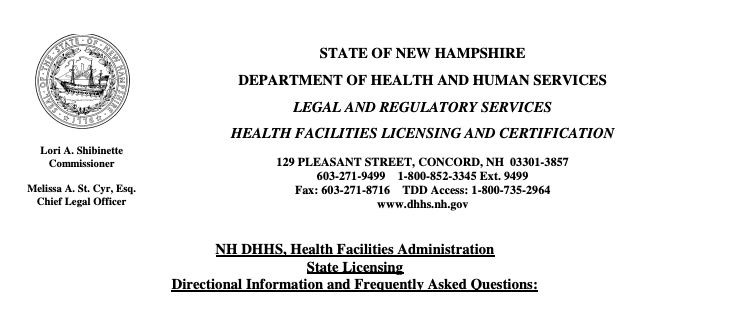New Hampshire’s addiction problem is getting worse - quickly.
Now is a great time to open an addiction treatment center in New Hampshire. According to the American Medical Response Opioid Crisis Summary Report, overdoses in New Hampshire are currently demonstrating and 11% increase month-over-month.
While New Hampshire does have strict addiction treatment center regulations, it is not a CON state, meaning that you do not have to obtain a Certificate of Need proving that your particular treatment center is “needed” in the state.
State regulations and hyperbole aside, In all likelihood, your facility is actually needed in New Hampshire. Indeed, back in 2015, the state was so desperate for more treatment facilities that it waived some of its more restrictive square footage requirements to address a shortage of beds in the state. In that decision, the New Hampshire Department of Health and Human Services relaxed licensing requirements, ceasing to insist on 160 square feet for every double occupancy room and instead embracing a more typical 120 square feet for every double occupancy room.
Research State Funded Grants in New Hampshire for Addiction Treatment Before You Begin the Process of Opening Your Rehab
There are several grants available to would-be addiction treatment center owners in New Hampshire. The Substance Abuse Prevention and Treatment Block Grant (SABG) accounts for a little under a third of all state funds going towards addiction treatment in New Hampshire.
Another grant for addiction treatment center operators is the SOR Grants, which originate from SAMHSA dollars and are then funneled to addiction treatment centers in New Hampshire through the New Hampshire Department of Health and Human Services. Between September 2018 and September 2019, the state awarded $22 million dollars through this grant.
Read Up On New Hampshire's Code of AdministratIve Rules as They Concern Addiction Treatment
New Hampshire’s Code of Administrative Rules contains 68 pages of rules and regulations that apply to addiction treatment centers. The rules are also restated in a document entitled, “State Residential Treatment for Behavioral Health Conditions: Regulation and Policy.”
"Residential treatment" is defined as clients receiving clinical treatment for SUD in a residential setting if they do not require limited or full medical withdrawal management.
When you’ve assembled all of the necessary paperwork, you're ready to submit your application. However - be careful! There are at least 26 different errors that addiction treatment centers can make in New Hampshire that may incur fees.
There’s a LOT of Fees AND Fines for Addiction Treatment Centers in New Hampshire
Yes, the application for addiction treatment center licensing in New Hampshire enumerates 26 different ways your center may incur a fine with the Department of Health and Human Services.
Among the relevant infractions:
Operating without a license
Continuing to operate without a license after a cease and desist order
Advertising services in such a way to mislead about licensure
Not transferring clients who need higher/lower levels of care than your center can provide
Admitting clients who need more services than you can provide
Being late with your license renewal paperwork
Most of these fines are in the $500 range, but the first violation (operating without a license) triggers a $2000 fine.
In New Hampshire, Remember: It’s Not a Treatment Center, it’s a SUD-RTF
New Hampshire state law refers to residential, inpatient addiction treatment centers when they say “SUD-RFTs.” SUD is of course short for Substance Use Disorder, while RTF is short for residential treatment facility.
Knowing the correct terminology helps when researching the rules and regulations imposed on your business model - before it’s too late.
The DHHS Website is the Best Resource for Getting Your Questions About Addiction Treatment Answered
The website is thorough and creates few barriers for would-be treatment center operators. It contains information on how to open not only an addiction treatment center in New Hampshire, but it also contains information on “recovery residences” or transitional housing for those who are newly recovered. It also has a handy FAQ about getting a treatment center license for the first time!
Do All Addiction Treatment Centers Need to Get Licensed in New Hampshire?
If your facility is not excluded, then yes. Also, sober living homes do NOT need to get certified in the state so if you’re only providing housing and not providing any clinical services, remember that it’s unlikely you’ll need to seek certification.
Feeling Overwhelmed About Opening an Addiction Treatment Center in New Hampshire? We Can Help.
Behave Health is committed to making it easier - and more profitable - to operate evidence-based, results-focused addiction treatment centers.
Our all-in-one app puts clinical, administration, staff, admissions, alumni, residents, treatment plans, billing, insurance authorizations and more - all at your fingertips.
Get your free trial started today and see why more addiction treatment centers prefer Behave Health.
Need help with certification? Behave Health can also help direct you to the right resources for help with Licensing or Accreditation by either The Joint Commission or CARF. Mention to your product specialist that you’re interested in this service after you start your free trial!






